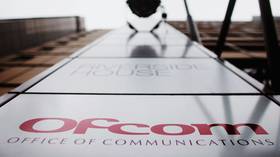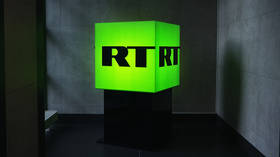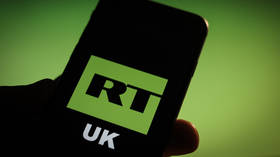Calls to ban RT in UK show what politicians really think of free speech

When talk turns to pulling the plug on international broadcasters operating in any realm, then things have certainly turned serious. But if the UK broadcast regulator Ofcom is seriously considering shutting down RT, it should be making that decision on its own, not with politicians wading in, arms flailing, making all sorts of demands.
We all marvel about having all those TV channels to choose from, hundreds of them beaming in from around the globe to our living rooms. Yet, paradoxically, we channel surf every night and still complain about finding nothing to watch.
But – and this is the important thing – at least we have that baffling choice, and it is not only a technological miracle but a tribute to the wonders of the information age we live in. No longer restricted to terrestrial, cable, or satellite, we can watch pretty much anything straight from the internet.
Yes, it’s confusing. Yes, there is a load of dross. And yes, there are views expressed that we might not agree with. But at least we have the option to choose, and that is the beauty, not just of the democracy we live in, but of the high regard in which we hold the right to freedom of speech.
You can say anything you like to anyone you choose, even if it upsets them. Just don’t expect everyone to agree with you. And that’s whether it’s over the dinner table or over the airwaves.
Former Scotland First Minister Alex Salmond, who hosts a show on RT, may not be everyone’s cup of tea. But so what? That doesn’t mean he should be silenced, as current First Minister Nicola Sturgeon suggested. Nor does it make him, or his sometime media colleague George Galloway, any sort of demon for choosing to contest the public narrative. They might be completely off the mark, or bang on target, but at least they’re asking those awkward questions. If either gentleman was lying or pushing fake news, that might be different. But they’re not.
They’re among the dissenting voices, the media figures with a sizable audience who deserve better than being slated as traitors or urged to quit their roles as disruptors and toe the line, simply because a government minister says so.
This is not an apologia for either Salmond or Galloway, who are more than capable of fighting their own corner without my help. But it is a defence of free speech. If you’re in two minds about this issue, then pause a second and imagine if the shoe was on the other foot. If the Russians decided to switch off the BBC in their country or block journalists from Sky or ITN working their beat, Brits would be outraged, and rightly so.
The current cultural climate demands that TV programmes are bookended by warnings of potentially upsetting content and guidance to a website for “anyone affected by these issues,” and while most of us just switch off when this irritating ‘nanny-knows-best’ nonsense appears, we do not need politicians adding to this white noise because they think it makes them look tough.
Anyone who can navigate their way through the TV guide labyrinth should be left alone to celebrate that none-too-small achievement and watch their selection in peace, without being guilt-tripped.
Refreshingly, Ofcom was quick to respond to political demands that it review RT’s position on the UK media landscape in language particular to bureaucracy that both agrees with a request while at the same time leaving enough wiggle room not to meet the minister’s request. Think, “Yes, Prime Minister.”
Addressed to Nadine Dorries, the Secretary of State of Digital, Culture, Media and Sport, its reply read in part, “Ofcom takes very seriously our role as the independent communications regulator, charged with upholding freedom of speech while ensuring that TV and radio audiences are protected from harm.”
And while Ofcom can sometimes be criticised, it was this implied ‘take your tanks off our lawn’ response, along with the assurance that the situation in Ukraine was being monitored, that was just enough to fulfil expectations both for those who expect pushback and for those who expect subservience. Ofcom also said, “We are expediting complaints in this area as a matter of urgency and we will not hesitate to take swift action where necessary.” It’s a tricky tightrope.
Our regulators are not perfect, not by a long shot, but at least they try to be fair. And when the clamour is growing around the need to restrict the output of foreign media outlets in a febrile atmosphere, it must be difficult to hold your nerve.
For now, Ofcom has done enough to appease both sides to this latest debate of freedom of speech, but, if the stakes rise further, questions will be asked and we can’t be sure at this point exactly where the cards might fall then.
The statements, views and opinions expressed in this column are solely those of the author and do not necessarily represent those of RT.
















